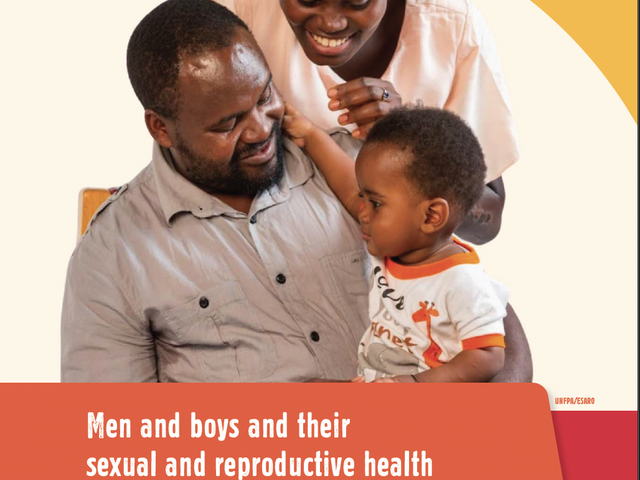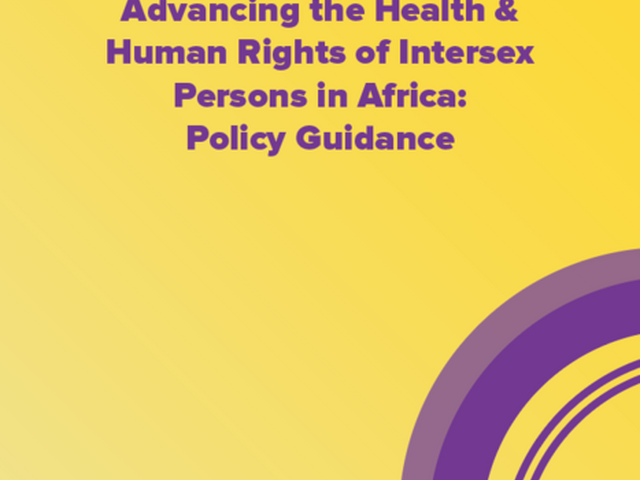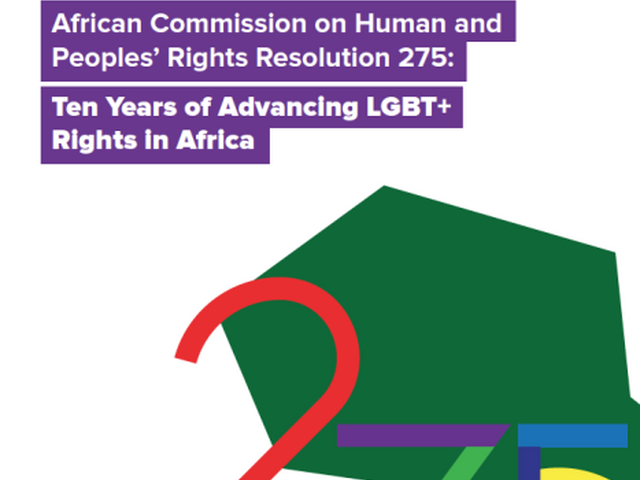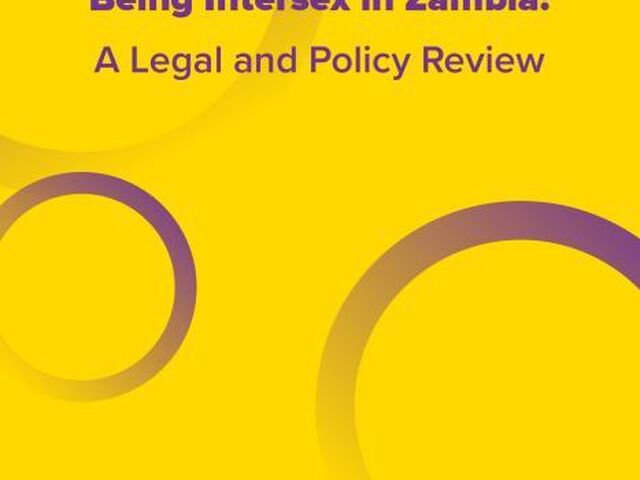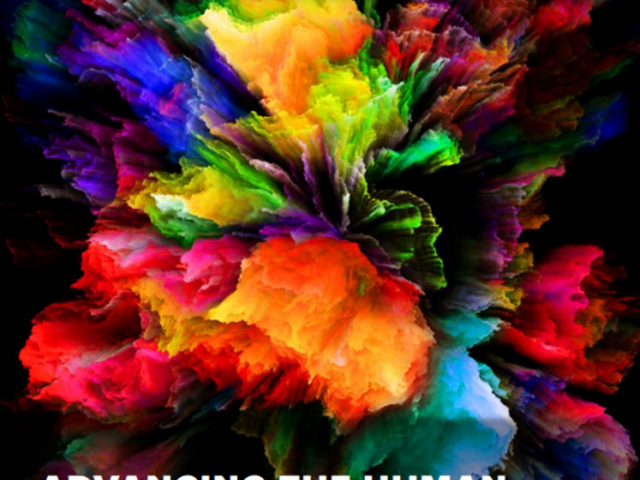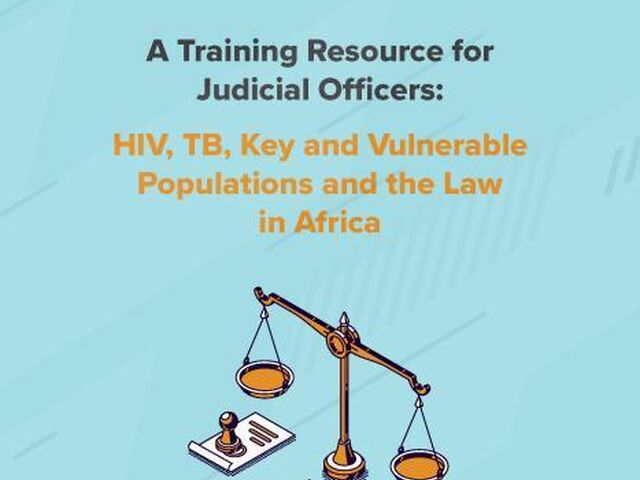Sexual Health and Wellbeing Resources: APHRC and Partners
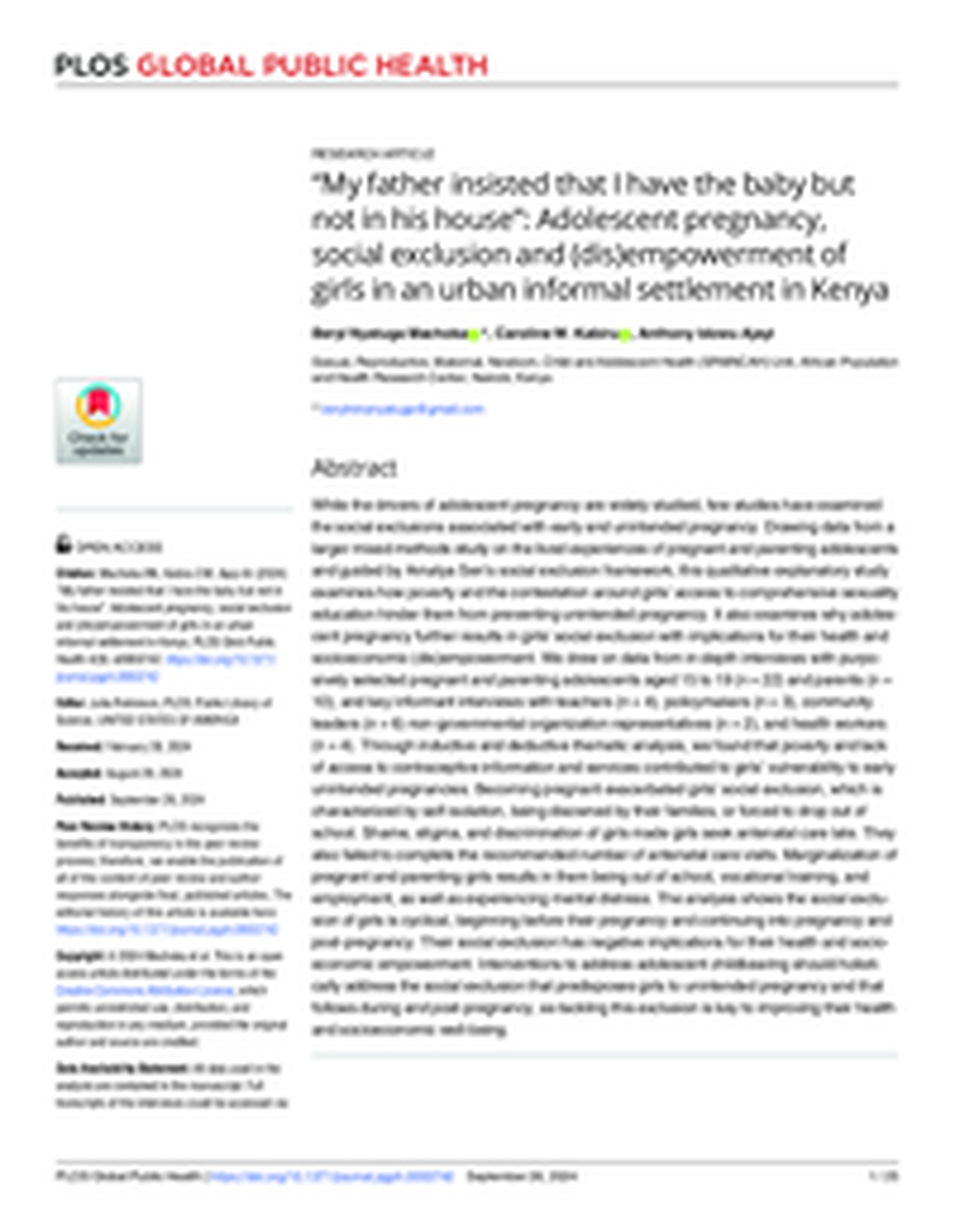
“My father insisted that I have the baby but not in his house”: Adolescent pregnancy, social exclusion and (dis)empowerment of girls in an urban informal settlement in Kenya | PLOS Global Public Health
1 MB
While the drivers of adolescent pregnancy are widely studied, few studies have examined the social exclusions associated with early and unintended pregnancy. Drawing data from a larger mixed methods study on the lived experiences of pregnant and parenting adolescents and guided by Amatya Sen’s social exclusion framework, this qualitative explanatory study examines how poverty and the contestation around girls’ access to comprehensive sexuality education hinder them from preventing unintended pregnancy. It also examines why adolescent pregnancy further results in girls’ social exclusion with implications for their health and socioeconomic (dis)empowerment.
Go to external page: Download
Risk and Protective Factors for the Sexual and Reproductive Health of Young Adolescents: Lessons Learnt in the Past Decade and Research Priorities Moving Forward
1 MB
This study is a scoping review of peer-reviewed literature published between 2010 and 2023 that examines risk and protective factors associated with sexual and reproductive health (SRH) outcomes among young adolescents aged 10-14 years. The review analyzes study characteristics, SRH outcomes explored, and the social-ecological levels of risk/protective factors investigated, with a focus on identifying research gaps and providing recommendations for future research priorities in this area.
Go to external page: Download
Promoting Holistic Health and Wellbeing of Pregnant and Parenting Adolescents and Their Children in Africa: A Life Course Model
923 KB
This is a feasibility assessment of the "PROMOTE Mothers' Club Curriculum," a life skills training intervention adapted from existing programs, for adolescent mothers in Korogocho, an informal settlement in Nairobi, Kenya. The research evaluates the curriculum's acceptability, relevance, usefulness, and appropriateness among these mothers, as well as the mentors' comfort in delivering the content. It explores the challenges and enablers associated with implementing the curriculum, identifies immediate training outcomes, and gathers suggestions for enhancing the curriculum and its delivery to inform the design of a multi-component intervention targeting adolescent parents and their children.
Go to external page: Download
Socio-ecological factors associated with probable depression among pregnant and parenting adolescent girls: findings from a cross-sectional study in Burkina Faso and Malawi | Reproductive Health
860 KB
This study examines the socio-ecological factors associated with probable depression among pregnant and parenting adolescent girls in Burkina Faso and Malawi. It uses a cross-sectional design, interviewing 980 girls in Burkina Faso and 669 in Malawi. The study assesses depressive symptoms using the Patient Health Questionnaire (PHQ-9) and collects information on individual, family, friends, and neighborhood characteristics. The goal is to identify multi-layered factors contributing to depressive symptoms and to highlight the need for multi-level interventions to address these vulnerabilities.
Go to external page: Download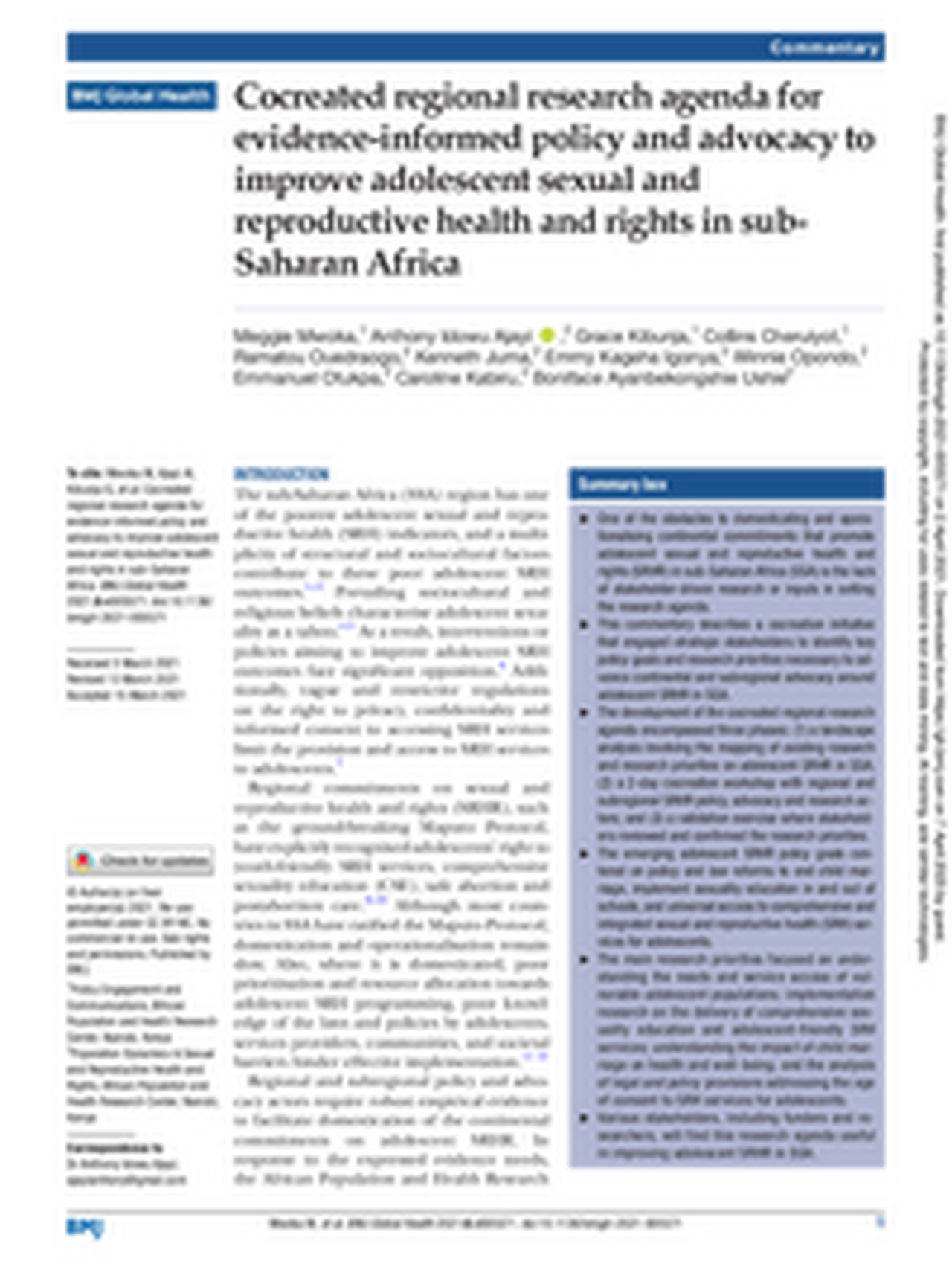
Co-created regional research agenda for evidence-informed policy and advocacy to improve adolescent sexual and reproductive health and rights in sub-Saharan Africa
192 KB
This article is about creating a regional research agenda for evidence-informed policy and advocacy to improve adolescent sexual and reproductive health and rights (SRHR) in sub-Saharan Africa (SSA). It involved a collaborative process with various stakeholders to identify key policy goals and research priorities needed to advance continental and sub regional advocacy around adolescent SRHR. The study describes the process of creating this agenda, which included a landscape analysis, a cocreation workshop, and a validation exercise. It highlights the identified advocacy goals, such as promoting access to education and comprehensive sexuality education (CSE) and ending child marriage, as well as the priority evidence needs, such as understanding the needs of vulnerable adolescents and the impact of CSE.
Go to external page: Download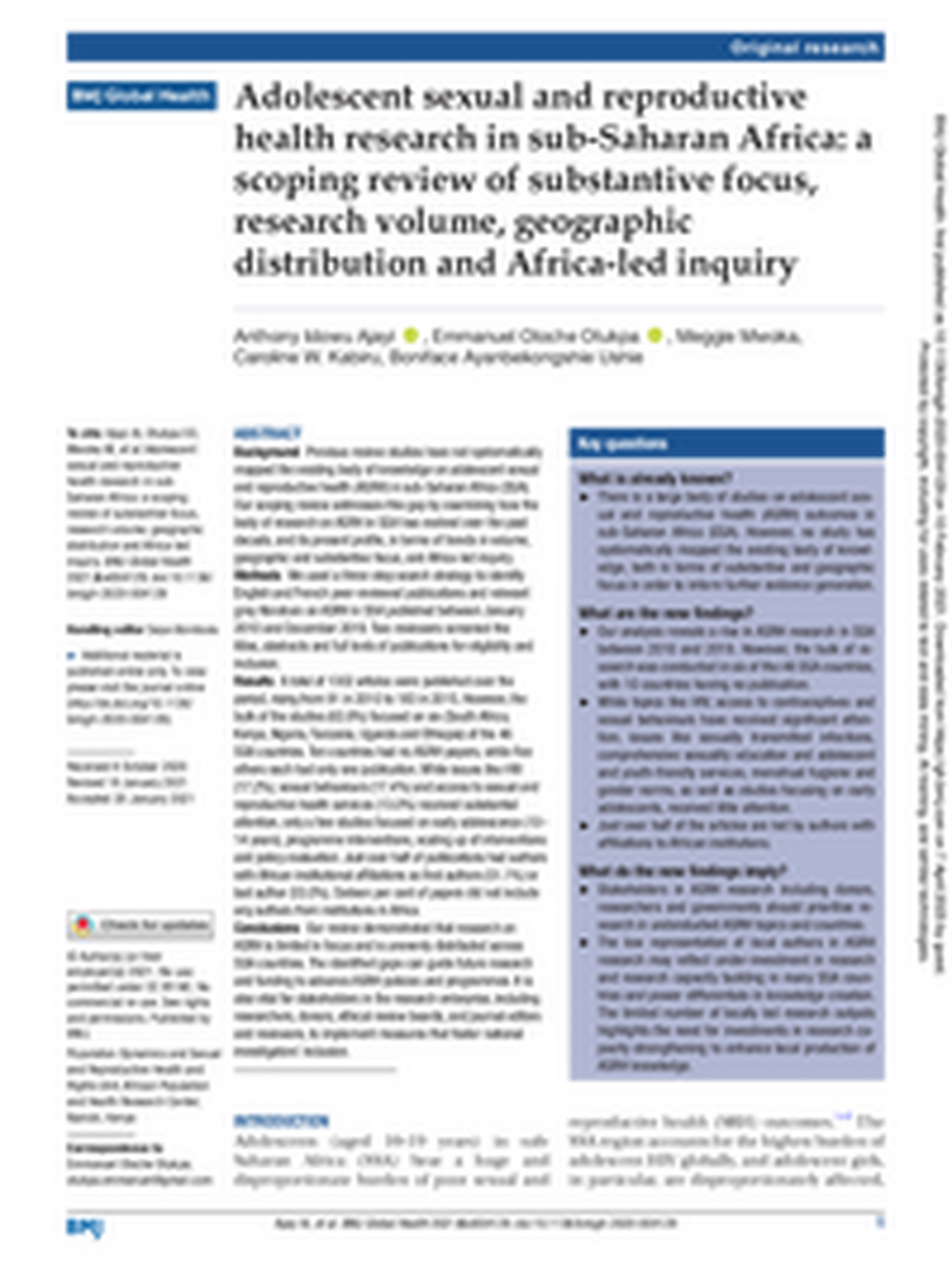
Adolescent sexual and reproductive health research in sub-Saharan Africa: a scoping review of substantive focus, research volume, geographic distribution and Africa-led inquiry | BMJ Global Health
1 MB
This is a scoping review that examines the existing research on adolescent sexual and reproductive health (ASRH) in sub-Saharan Africa (SSA). It aims to map out the current state of knowledge, including trends in research volume, the geographic distribution of studies, the substantive focus of the research (like HIV, sexual behaviors, access to services, etc.), and the extent to which the research is led by African institutions. The study identifies gaps in the existing research and provides recommendations for future priorities to advance ASRH policies and programs in SSA.
Go to external page: Download
Research priorities to support evidence-informed policies and advocacy for access to safe abortion care in sub-Saharan Africa
2 MB
This paper highlights the need to establish research priorities to support evidence-informed policies and advocacy for access to safe abortion care in sub-Saharan Africa (SSA). It outlines a process of co-creating a research agenda involving landscape analysis, a stakeholder workshop, and a validation exercise. The agenda identifies key policy advocacy goals and priority evidence needs, including estimating the incidence and costs of unsafe abortion, examining the role of abortion laws, and documenting successful approaches to address societal barriers to safe abortion care. It aims to guide researchers, policymakers, and other stakeholders in generating and using evidence to advocate for and implement comprehensive abortion care (CAC) in SSA.
Go to external page: Download
Impact of the COVID-19 Pandemic on Sexual and Reproductive Health Services in Burkina Faso, Ethiopia, Kenya, Malawi and Uganda
31 MB
This report examines the impact of the COVID-19 pandemic on sexual and reproductive health (SRH) services in five sub-Saharan African countries: Burkina Faso, Ethiopia, Kenya, Malawi, and Uganda. It analyzes the availability, access to, and utilization of SRH services during the pandemic, based on interviews with women and girls, healthcare providers, representatives from civil society and non-governmental organizations, and policy makers. The report highlights the disruptions caused by COVID-19 and the related government restrictions, and explores the challenges faced by individuals seeking SRH services and the strategies adopted by health facilities to ensure continuity of care. It also provides key recommendations for addressing the adverse effects of the pandemic on SRH and strengthening health systems for future crises.
Go to external page: Download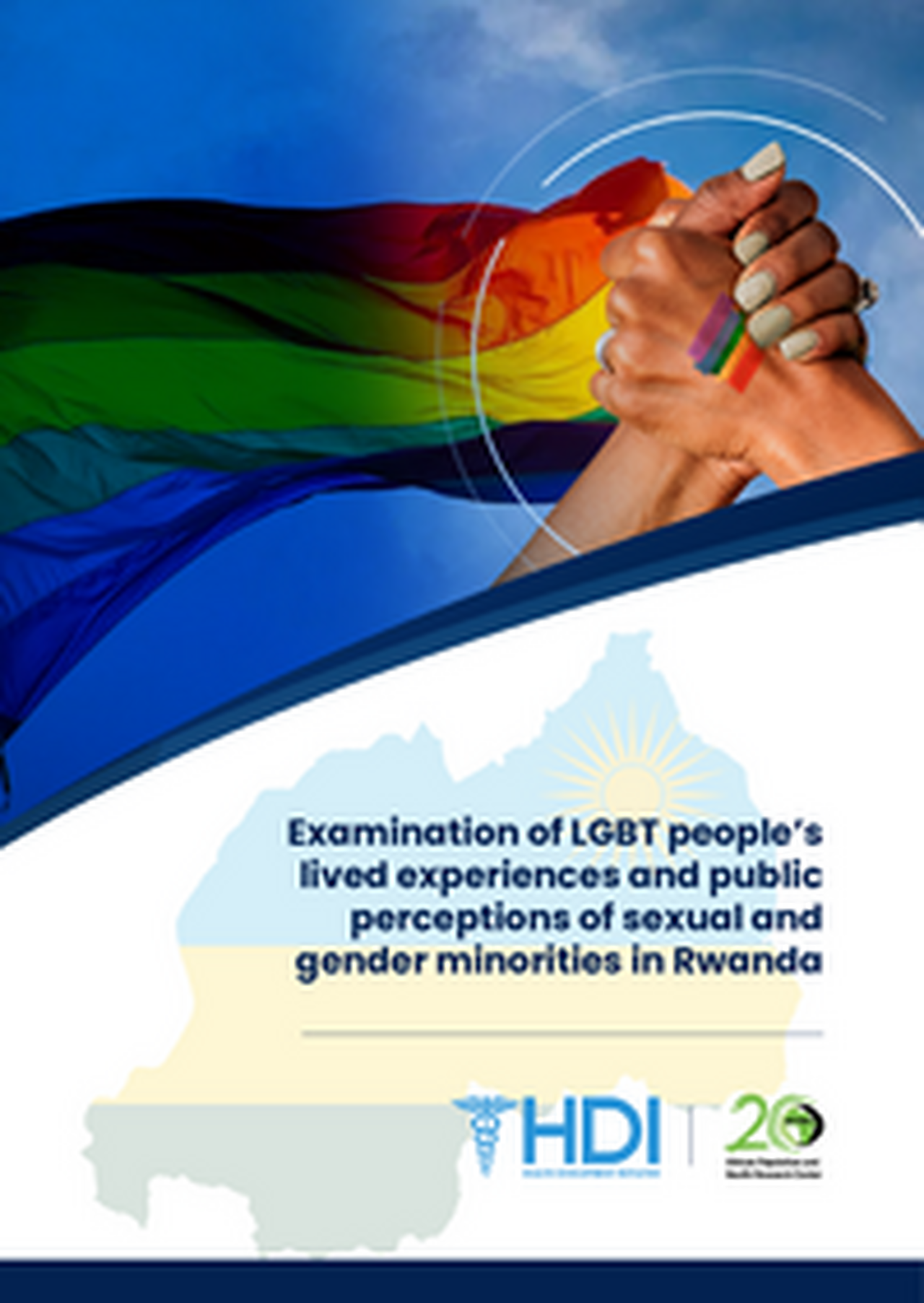
Examination of LGBT people’s lived experiences and public perceptions of sexual and gender minorities in Rwanda
13 MB
This report examines the lived experiences of Lesbian, Gay, Bisexual, and Transgender (LGBT) people and public perceptions of sexual and gender minorities in Rwanda. It is a mixed-methods study conducted in Kigali and the Southern Province of Rwanda, aiming to understand the nature and extent of social exclusion, discrimination, and well-being of LGBT individuals, as well as the attitudes and knowledge of the general public towards them. The report also explores the impact of COVID-19 on the LGBT community and provides recommendations for addressing the challenges faced by LGBT people in Rwanda.
Go to external page: Download
Co-created research agenda to support advocacy toward social inclusion for sexual and gender minorities in sub-Saharan Africa
2 MB
This article highlights the challenges faced by LGBT+ people in sub-Saharan Africa, including discrimination and human rights violations, and emphasizes the need for evidence-based advocacy to address these issues. It details six key research priority areas identified through the collaborative process, such as understanding the history and lived experiences of LGBT+ people in Africa, the cost of non-inclusion and benefits of inclusion, and strategies for fostering inclusion. The document ultimately aims to guide researchers, implementing agencies, and funders in their work on LGBT+ issues in sub-Saharan Africa.
Go to external page: Download*Note: Publications published on the 2gether 4 SRHR Knowledge Hub are the sole responsibility of the organization concerned. Publications do not necessarily reflect the views of 2gether 4 SRHR, nor its participating organizations.
